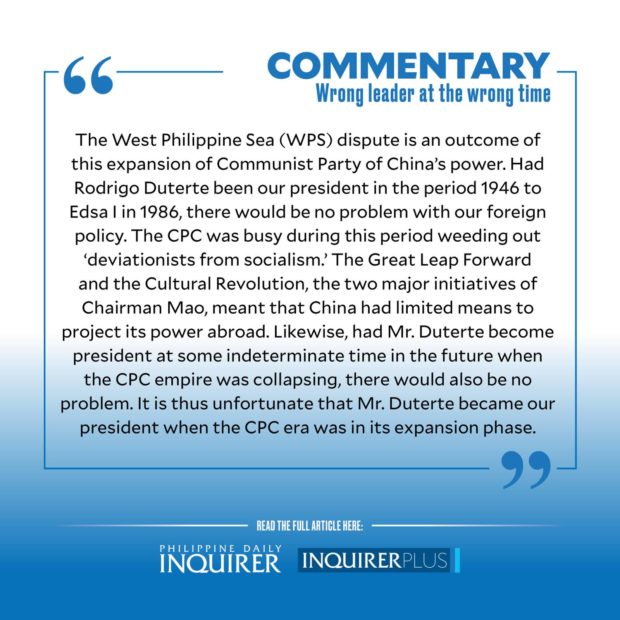
China has always been a vast empire. Throughout history, it has been ruled by dynasties. Each dynasty has gone through three epochs, a period of consolidation followed by expansion and then contraction of power. The constant is that no dynasty has ruled China forever. Thus, there is a school of Sinologists who maintain that the Communist Party of China (CPC) will go through the same epochs as previous dynasties and eventually follow them into oblivion.
(The Sinologists of the defunct Soviet Union were the original proponents of the doctrine that the CPC would follow the same path as earlier Chinese dynasties. The USSR and its predecessor states had been constant victims of Chinese expansions in the past.)
The CPC assumed power in 1949. The Deng Xiaoping reforms in 1978 abandoned the socialist planned economy in favor of the free market economy, ending the consolidation phase of the CPC era. The repression in 1989 of the Tiananmen movement meant there would be no serious challenge to the CPC’s monolithic rule for a long time. As expected, the modernization of the Chinese economy was used to enhance the party’s political footprint.
The West Philippine Sea (WPS) dispute is an outcome of this expansion of CPC power. Had Mr. Duterte been our president in the period 1946 to Edsa I in 1986, there would be no problem with our foreign policy. The CPC was busy during this period weeding out “deviationists from socialism.” The Great Leap Forward and the Cultural Revolution, the two major initiatives of Chairman Mao, meant that China had limited means to project its power abroad. Likewise, had Mr. Duterte become president at some indeterminate time in the future when the CPC empire was collapsing, there would also be no problem.
It is thus unfortunate that Mr. Duterte became our president when the CPC era was in its expansion phase. Mr. Duterte is a city mayor who did not outgrow his mayoral mentality. Upon becoming president, he did not recognize the dichotomy between domestic and foreign policy. Mature societies invariably separate the two by pursuing a nonpartisan foreign policy under the doctrine that “politics stops at the water’s edge.” The mindset of Mr. Duterte facilitated Chinese encroachment into our domain in the WPS.
I grew up in a place in Tondo where bullies roamed. There are three types of victims of bullying. Victim A, despite the disparity in power, fights the bully. This is exemplified by Vietnam in its response to Chinese aggression. Victim B, recognizing the lopsided contest, calls on the police to enforce the law. This was done by then President Benigno Aquino III when he referred the WPS dispute to The Hague tribunal. Aquino won a favorable ruling from the tribunal. Victim C, on the other hand, is so intimidated by the bully that he neither resists nor calls the police to protect his rights. This characterizes the action of President Duterte in the WPS.
He meekly accepts the bullying and enters into what he has justified as “friendly relations” with China. In return for the promise of $24 billion in foreign investments, he allowed China to encroach on our aquatic domain in the WPS. It has been estimated that at the minimum, China harvests $6 billion worth of resources from our domain annually, meaning that, in the six years President Duterte is in office, China would be harvesting resources far in excess of the $24 billion investments promised us. One must note further that any investment by China must be repaid by us. However, China does not compensate us for the resources it gets from the WPS.
Our current relationship with China replicates that of the colonial era. In those days, the colonial power extracts resources from its colonies without compensating the locals. The infrastructure constructed by the colonial masters is paid for by taxes levied on the colonies. The claim by Mr. Duterte that he is pursuing an “independent foreign policy” is actually a throwback to the exploitative system in the colonial era.
This is one of the major issues that our countrymen should address in the coming elections. One of the major outcomes of World War II was the termination of colonial rule. It is strange that we should maintain such a relationship with China now.
——————
Hermenegildo C. Cruz is a retired career diplomat who served as ambassador to the Soviet Union, Chile, Bolivia, and the United Nations. He has a graduate degree from the Fletcher School of Law and Diplomacy.

